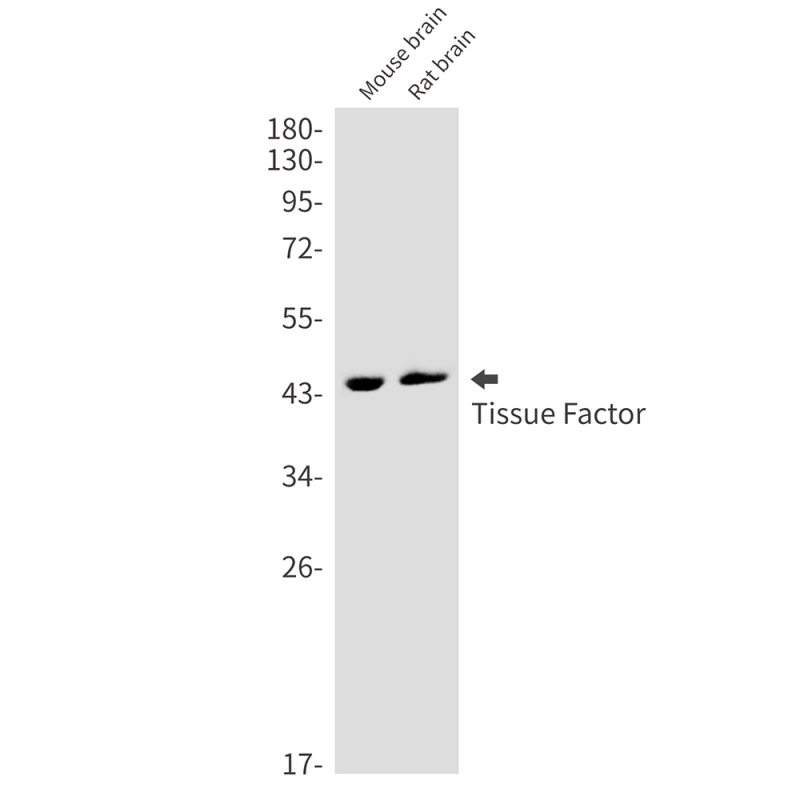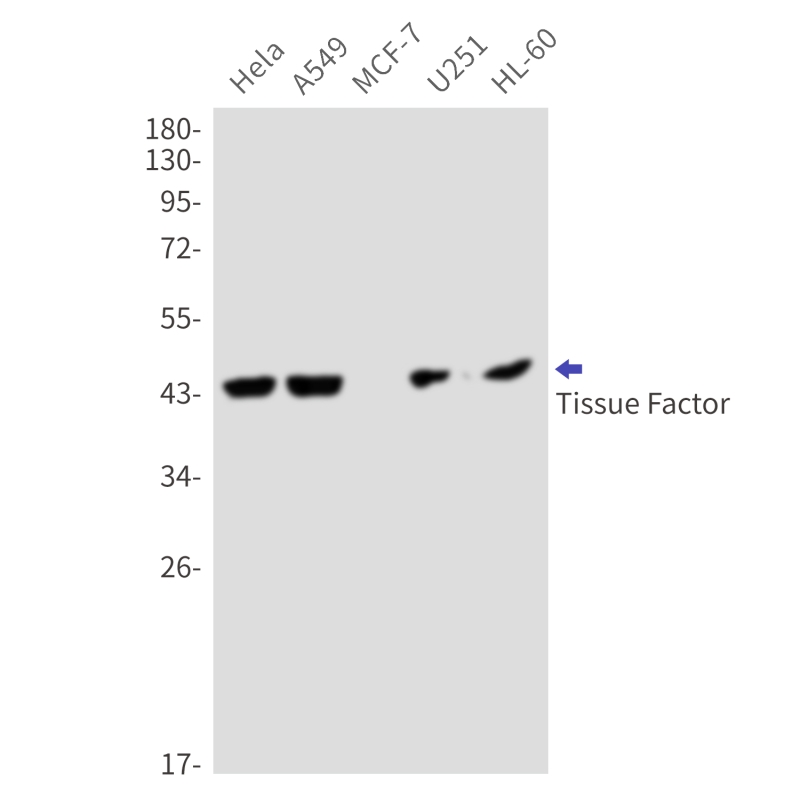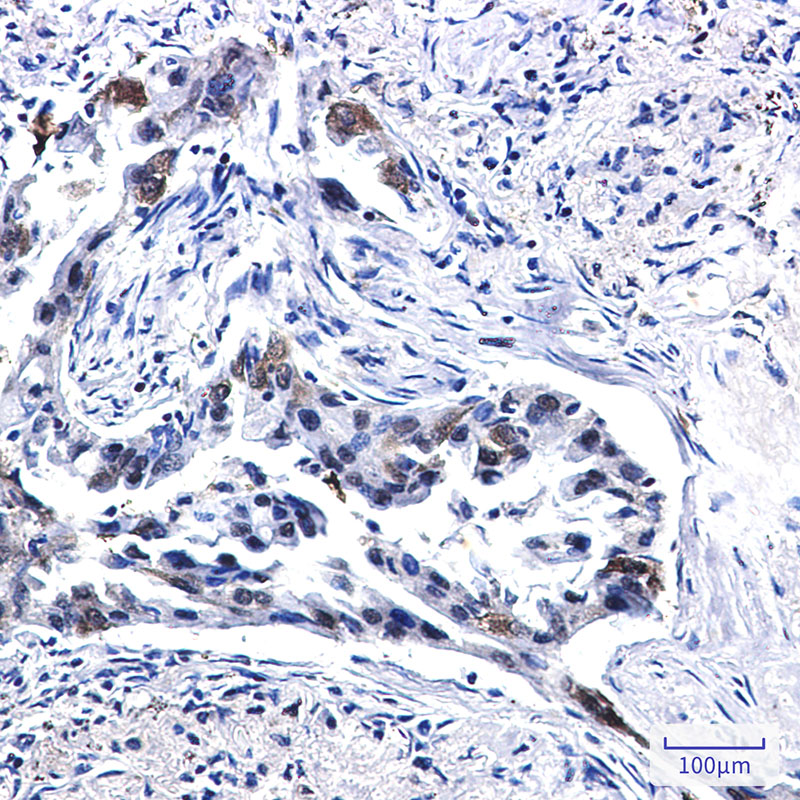


| WB | 1/500-1/1000 | Human,Mouse,Rat |
| IF | 咨询技术 | Human,Mouse,Rat |
| IHC | 1/50-1/100 | Human,Mouse,Rat |
| ICC | 技术咨询 | Human,Mouse,Rat |
| FCM | 咨询技术 | Human,Mouse,Rat |
| Elisa | 咨询技术 | Human,Mouse,Rat |
| Aliases | F3; Tissue factor; TF; Coagulation factor III; Thromboplastin; CD antigen CD142 |
| Entrez GeneID | 2152 |
| WB Predicted band size | Calculated MW: 33 kDa; Observed MW: 45 kDa |
| Host/Isotype | Rabbit IgG |
| Antibody Type | Primary antibody |
| Storage | Store at 4°C short term. Aliquot and store at -20°C long term. Avoid freeze/thaw cycles. |
| Species Reactivity | Human,Mouse,Rat |
| Immunogen | A synthetic peptide of human Tissue Factor |
| Formulation | Purified antibody in TBS with 0.05% sodium azide,0.05%BSA and 50% glycerol. |
+ +
以下是3篇关于Tissue Factor(TF)抗体的代表性文献摘要示例(基于公开知识整理,具体文献需核实):
---
1. **文献名称**: *"Monoclonal antibodies against human tissue factor: characterization and in vivo coagulation blockade*"
**作者**: Paborsky, L.R. et al. (1991)
**摘要**: 报道了重组人TF单克隆抗体的制备及功能研究,证明其能特异性阻断TF与凝血因子VIIa的结合,抑制体外凝血活性,并探讨了其在抗血栓治疗中的潜力。
---
2. **文献名称**: *"Targeting tissue factor on tumor cells and angiogenic endothelial cells with factor VII-specific antibody*"
**作者**: Huang, X. et al. (2008)
**摘要**: 研究了一种靶向TF的抗体(hFVII-IGg1)在肿瘤治疗中的作用,显示其能通过抑制TF介导的肿瘤细胞信号通路和血管生成,显著减少小鼠模型中肿瘤生长。
---
3. **文献名称**: *"Antibody-mediated inhibition of tissue factor reduces thrombus formation in a primate model of acute coronary thrombosis*"
**作者**: Muñoz, F. et al. (2013)
**摘要**: 在灵长类急性冠状动脉血栓模型中,验证了一种抗TF抗体的治疗效果,发现其能有效减少血栓形成并降低炎症反应,为心血管疾病治疗提供新策略。
---
4. **文献名称**: *"Anti-tissue factor antibodies ameliorate coagulopathy in a sepsis model*"
**作者**: Grover, S.P. et al. (2019)
**摘要**: 探讨抗TF抗体在败血症相关凝血功能障碍中的作用,发现其能调节凝血级联反应,改善实验动物的生存率,提示其治疗脓毒症凝血异常的潜力。
---
如需具体文献全文或DOI,建议通过PubMed、Google Scholar等平台检索关键词(如 "Tissue Factor antibody" + 研究领域)。
**Background of Tissue Factor Antibodies**
Tissue factor (TF), also known as coagulation factor III, is a transmembrane glycoprotein encoded by the *F3* gene. It serves as the primary initiator of the extrinsic coagulation cascade by binding factor VII/VIIa, forming a complex that activates downstream clotting factors, ultimately leading to thrombin generation and fibrin formation. Beyond hemostasis, TF plays roles in pathological processes, including cancer progression, inflammation, and thrombosis. Tumor cells, for instance, often overexpress TF to promote angiogenesis and metastasis.
Tissue factor antibodies are laboratory tools designed to specifically target and bind TF for research or therapeutic purposes. Monoclonal antibodies (mAbs) against TF are widely used in *in vitro* and *in vivo* studies to investigate TF's biological functions, such as its role in cancer-associated thrombosis or sepsis-induced coagulopathy. These antibodies enable techniques like immunohistochemistry, flow cytometry, and Western blotting to detect TF expression in tissues or cells.
Therapeutically, anti-TF antibodies have been explored to inhibit pathological coagulation or tumor growth. For example, some mAbs block TF-FVIIa interaction, suppressing procoagulant activity in conditions like disseminated intravascular coagulation (DIC). However, challenges remain in balancing efficacy with bleeding risks. Research also focuses on antibody-drug conjugates (ADCs) targeting TF-expressing cancers.
In summary, TF antibodies are vital for both understanding TF's multifaceted roles and developing targeted therapies, though clinical translation requires careful optimization of specificity and safety.
×